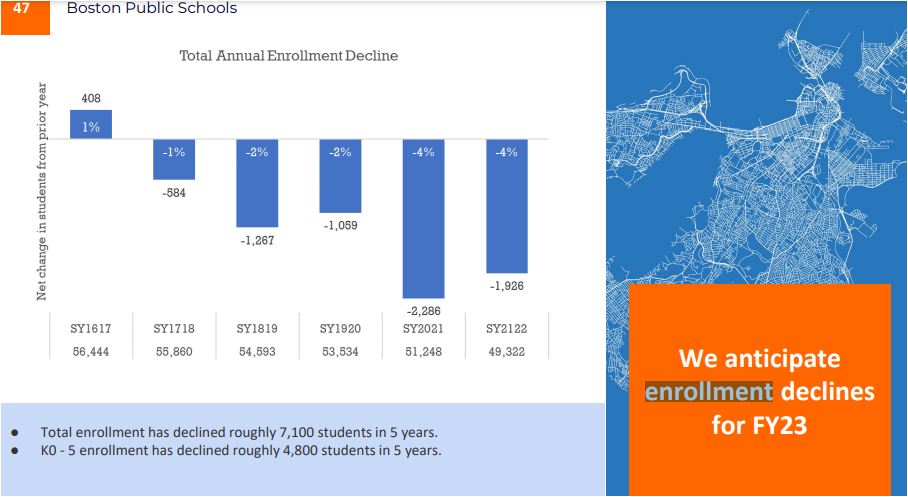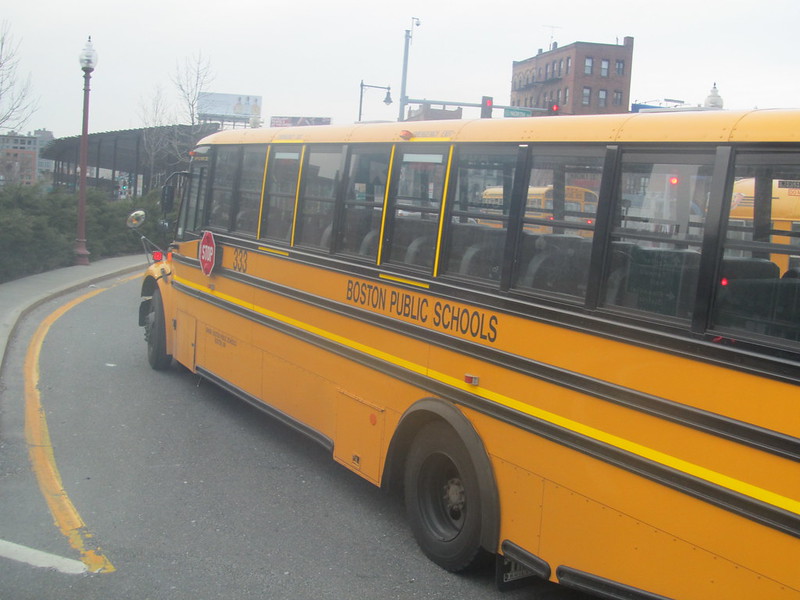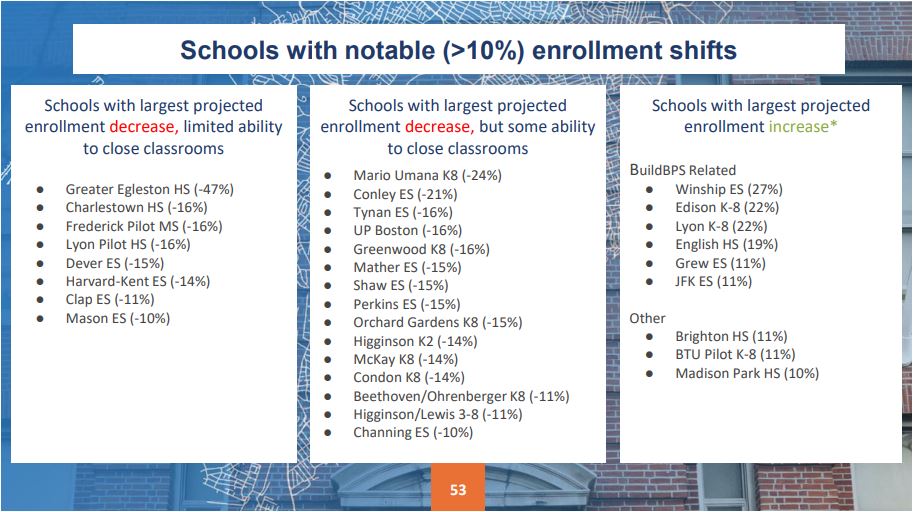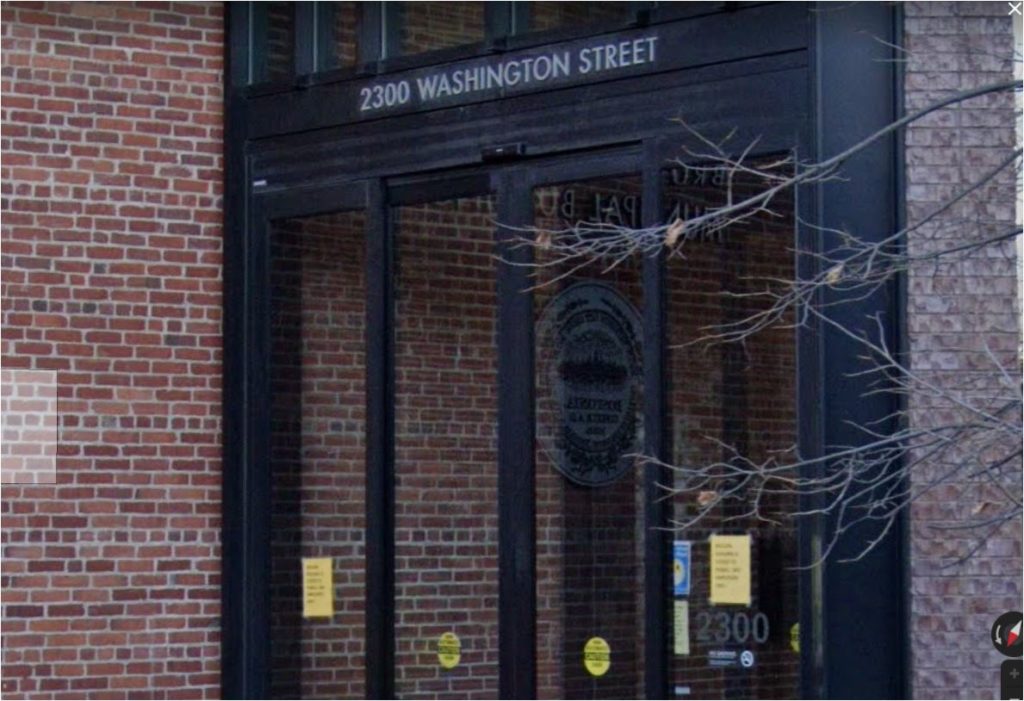by MIKE FREEDBERG
SPECIAL TO EASTBOSTON.COM
Two weeks ago, the public got to see next year’s proposed school department budget.
It’s a big number – approximately 40 percent of the entire City budget for all departments. That’s nothing new. For the entire 10 years I’ve covered the beat, Boston’s schools have been a money elephant. The problem isn’t only its size but also the lopsided allocations. In other words, where the money lands.
The number is obese: $ 1.3 billion, up from $1.2 billion, the number from Fiscal Year 2022.
Let that sink in. Current enrollment of 49,000 students – is down from 54,000 five years ago. The system citywide has a has seating capacity of 92,000. In the nine previous budgets I have analyzed, the cost per pupil basis has increased as enrollment has decreased.

Let’s take a look:
Salaries and employee benefits devour a full $1.05 billion of this year’s $1.33 billion budget. A full 78 percent of all school funds go to school employees, teachers mostly but also custodians, aides, secretaries, central office, coaches, and “support.”
“Property services” — i.e., maintenance and repair of the city’s vast portfolio of facilities – takes up another $51.8 million, up from last year’s $ 45.6m. Then comes “transportation” – i.e., busing which accounts for $116.4 million up from $111.7 million
All of which leaves only $21.6 million – one and a half percent of the full budget — for schoolroom equipment and supplies.
No wonder that BPS parent groups complain that the schools are underfunded.
Except that the system IS NOT under-funded!
Take the $116.4 million allocated to “TRANSPORTATION.” Why is it needed? The busing order imposed on a segregated Boston almost 50 years ago is socially irrelevant today. There are no more segregated neighborhoods out of which “marginalized’ children must be bused.

Yet the busing continues, and the pot-luck seating assignment system that accompanies it, costs the system dollars — dollars it ought to apply to classrooms and troubling parents who have a valid objection to sending their kids all across the city based upon a roll of the dice.
Before I continue on with the budget, let me say once again that this year’s anomalies are not new. They’ve been there, in one degree or another, for all the 10 years that I have covered Boston’s school budgets.
They’ve been there through four short-tenured superintendents, the last three of them (Tommy Chang, Laura Perille, Brenda Cassellius) who were for most part strangers brought in from the outside by an expensive, consultant-managed “nationwide search” process. Ostensibly, the process is nothing but a dodge against accusations of insider favoritism which dogged the school system back in the bad old days when enrollment hit 92,000 students.
Not that I fault the outsider superintendents for their records of short-lived hits and misses. It’s hard enough for a school department lifer to get control of both budget and administration dynamics. The superb — yet cautious — achievements of careerist John McDonough, from 2012 to 2015, show that.
Imagine, then, the difficulty that an outsider has faced trying to win the confidence of the departments’ various segments: the business office, Title IX and Title I administrators, curriculum developers, custodians, secretaries, public relations, vice principals, principals, and the teachers union.

You get the idea.
I worked in the school committee back in the early 1970s, and I can tell you that the system was hard to crack – built as it was upon work groups that had their own internal solidarities.
Even a dictatorial, charismatic superintendent — as was Bill Ohrenberger — found it hard to impose his directives upon, for example, the vice principals, if they as a group chose to defy. Ohrenberger was a Boston public school lifer, and he had personal connections up and down the entire employee chain. Yet, even he made enemies galore and was finally forced to retire. Since then, every single Boston school superintendent with the exception of John McDonough have had their careers cut short.
The recent announcement that Brenda Cassellius will leave later this year is no surprise. Will the system now learn, finally, from its evasions and turn to school department insiders like enterprising Andrew Bott or Mike Contompasis, to reform the entrenched bureaucracy? Employees command 78 percent of all school funds and more importantly — for them –command 100 percent of the political clout. Can they be taken on?
Don’t bet on it.

As I write, there’s another expensive, consultant-managed “nationwide search” underway for what will turn out to be a toothless figurehead.
Now on to some budget reform specifics:
The Commonwealth of Massachusetts has supposedly shipped around $30 million in aid to Boston’s schools. The Feds, another $480 million.
Where are those monies? Into which bank account were the funds deposited? And when? Have they or any part of them been since transferred to other accounts? How do these monies figure into the proposed Fiscal Year 2023 budget?
Don’t we have a right, even a duty, to know?
I call for a system-wide audit of the entire budget, and of its various funding streams, to be conducted by an independent auditing agency such as the Boston Municipal Research Bureau — an audit not only of Fiscal Year 2022 but of the prior seven years. I call for nothing less than a full forensic audit with the results to be made public.
I also call for an end to the $ 116 million transportation allocation with that money redirected to classroom supplies and equipment. There is no reason, for example, why most Boston public schools should lack an in-house library or a librarian to manage it. Nor is there any reason why the school department’s lunch kitchens should be the subject of spotlight team reports of waste or spoilage.
Why do the Department’s school facilities fail – so I am told by a very active Hyde Park school parent — to meet energy-efficient standards? Funds from the federal government for energy modernization were made available 30 years ago!
Why do we, alone among Massachusetts municipalities, not elect at least some of our school committee? Recently, Bill Walczak argued that there shouldn’t be a Boston school committee at all. I roundly disagree.
Parent and taxpayer input is crucial for a system that consumes up $ 1.3 billion of city money with the goal of educating nearly 50,000 of our kids. The mayor is accountable to the voters for many things; it’s almost impossible to single her out on school issues.
Yet someone ought to be accountable for school department decisions, or lack thereof.
We agree as a community to fund our schools with taxpayer money. Why? Because the community as a whole is much better off if our kids are educated and prepared to enter tomorrow’s workforce.
The job of education is distinct from every other City government mission. Those can, mostly, be done on the fly, corrections made later. A school year lost cannot be made good.
On these grounds I disagree with Bill Walczak. Yet I understand his frustration. The present appointed school committee – and the mayor who appointed them and all their predecessors – have failed to address huge systemic failures that have been glaringly obvious for decades. The time to change the music is now. Enough of the go along-get along song; time for some rock and roll rebellion. Our kids must no longer be sweet-talked to a graduation that leaves them unprepared for real life.
— Mike Freedberg
Mike Freedberg is a journalist and consultant with many years of experience writing for Boston media and participating in political campaigns. He publishes the blog Here and Sphere. Read his work on EastBoston.com here.














